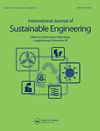Modeling the implications of sustainable supply chain practices on sustainable performance in Ghana’s petroleum industry: the role of stakeholders’ pressure
IF 3.6
Q3 GREEN & SUSTAINABLE SCIENCE & TECHNOLOGY
International Journal of Sustainable Engineering
Pub Date : 2022-11-27
DOI:10.1080/19397038.2022.2149875
引用次数: 3
Abstract
ABSTRACT The influx of Agenda 2030 for Sustainable Development and the COP 21 has necessitated the need for a paradigm shift in traditional consumption and production to reflect a balance between environmental safety, social justice and profitability. The Ghanaian Petroleum Industry is predominately fossil fuel–based with higher level of carbon and methane emissions. Ensuing from the Stakeholders’ and the Resource-Based View theories, this paper aims to develop a model to explain the relationship between sustainable supply chain management (SSCM) practices and sustainable performance (SP) by examining the extent to which pressure from stakeholders could strengthen the proposed model in the context of downstream petroleum supply chain. Variance-Based Partial Least Square method has been used to analyse a cross-sectional data from Oil Marketing companies in Ghana. Our results have revealed that SSCM practices such as environmental, economic, and social are positively related to SP. Moreover, stakeholder’s pressure positively and significantly relates to SP. Again, stakeholders’ pressure significantly moderate the relationships between environmental and social dimensions of SSCM practices and SP. By implications, there is an emergency of an SP model with enhanced predictability. Again, policymakers and advocates can achieve greater sustainability by maximising stakeholders’ pressure.可持续供应链实践对加纳石油工业可持续绩效的影响建模:利益相关者压力的作用
摘要《2030年可持续发展议程》和《联合国气候变化框架公约》的大量出台,使得传统消费和生产模式的转变成为必要,以反映环境安全、社会正义和盈利能力之间的平衡。加纳石油工业主要以化石燃料为主,碳和甲烷排放量较高。本文旨在从利益相关者和基于资源的观点出发,建立一个模型,通过考察利益相关者的压力在多大程度上可以在下游石油供应链的背景下加强所提出的模型,来解释可持续供应链管理(SSCM)实践与可持续绩效(SP)之间的关系。基于方差的偏最小二乘法已用于分析加纳石油营销公司的横断面数据。我们的研究结果表明,环境、经济和社会等SSCM实践与SP呈正相关。此外,利益相关者的压力与SP呈正显著相关。同样,利益相关方的压力显著调节了SSCM实践的环境和社会维度与SP之间的关系,存在具有增强的可预测性的SP模型的紧急情况。同样,政策制定者和倡导者可以通过最大限度地增加利益相关者的压力来实现更大的可持续性。
本文章由计算机程序翻译,如有差异,请以英文原文为准。
求助全文
约1分钟内获得全文
求助全文
来源期刊

International Journal of Sustainable Engineering
GREEN & SUSTAINABLE SCIENCE & TECHNOLOGY-
CiteScore
7.70
自引率
0.00%
发文量
19
 求助内容:
求助内容: 应助结果提醒方式:
应助结果提醒方式:


